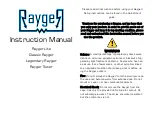
HT 280 Campersat Test Meter Operating Manual
2
September 2014
Specification:
Input frequency
950-2150 Mhz
Through loss
3.5dB
Input Impedance
75 Ohm, F
connector
Measuring method
Signal presentation
with LEDs pitch
tone indicator on
loudspeaker
2 Rows 10’s and
units. Digital LED
display
Max-Level LEDs
showing max- value
Highest pitch tone
on speaker-
stronger the signal
Power supply
Through Coax-
cable (from
receiver)
External DC power
supply 12-18 volt.
(Not used )
Power consumption
10 mA without
loudspeaker.
25 mA with
loudspeaker.
Weight
0.1kg
Dimensions
145 x 55 x 20mm
Hints and Tips
The following additional notes should help.
•
In areas where the PAY-TV signal is strong
rotating the LNB will cause an increase in
signal. This increase should be
ignored
. Set
the polarisation manually to the correct
position.(For the technobuffs when viewing
vertical signals correct polarisation may
correspond to a signal
minimum
)
•
There are currently four satellites usually
visible. Going east from west of North ...
that is Optus B3,
Optus C1/D3,
Optus B2,
Intelsat 8. Just be confident you are on the
correct one. If you are on the wrong
satellite, the test meter will peak but the
receiver may not recognise the signal.
Currently the
VAST
receiver will onlly
recognise
Optus C1 and Optus D3
•
When scanning the sky you may encounter a
broad signal peak.
This usually means a microwave noise source
of some sort. -
Ignore this signal
By sharp, we mean approx 1-2 degrees.
•
It is usually easier to set the elevation first
and then swing the dish to find the satellite.
•
Errors in elavation may lead you to trim up
on the wrong satellite.




















